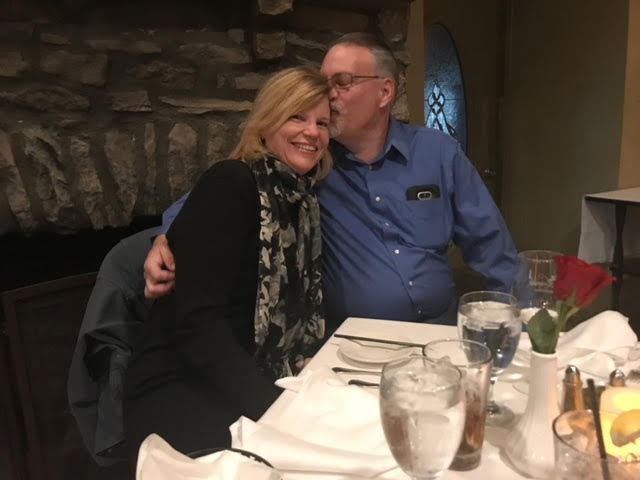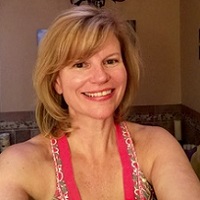
“Imagine a comfort zone so expanded that it can easily fit an entire day, no matter what happens. The day unfolds, and the mind doesn’t say anything…You realize that you will always be fine.” ~ Michael A. Singer, The Untethered Soul
~
I read this quote at 7 a.m. on a Saturday morning.
Hours later, I rushed to the emergency room to be with my fiancé, who had suffered a massive stroke. As my daughter and I talked to his doctors, I kept thinking of Singer’s guidance.
Just let what is happening wash over you. Don’t block it, don’t resist—just accept.
Later, when my fiancé was resisting treatment, I touched him on the shoulder, looked him in the eyes, and said, “Love, you have had a stroke. You need to accept this, so these people can help you. Acceptance is the only way to get through this.”
As the day unfolded, I kept grasping at my comfort zone. With every awful development, I would breathe in and let it wash over me, trying to let the horror of the situation go.
This didn’t always work. While waiting for him to get out of surgery, my daughter and I went to the interfaith chapel at the hospital: a semi-circular room with altars to every religion. There was even a Buddha and the metta prayer posted on one wall:
“May you be happy, may you be free.”
It was here I had my lowest point. Where all the self-pitying hit. Lord, I was abused by my mother, was cheated on and divorced not even three years ago, and now my love is fighting to live. Life was unfair. I railed at my deceased father, a minister, for allowing me to be abused by my mother.
When faced with new pain, old pain comes roaring back.
I said, “You owe me Dad. You f*cking owe me for ignoring her abuse all those years. Make this right. Give him back to me!”
I left the chapel with my daughter and headed back to the surgery waiting room. The HGTV show “Fixer Upper” was on constant loop. Usually, watching the show gave me comfort. But now it hurt to see the happy couple with their remodeling enthusiasm. Sometimes, cute and cuddly can be a painful stab to our hearts.
When we were able to get back into my fiancé’s room, I held his hand, looking for signs of the man I loved. I picked up The Untethered Soul again and began reading Chapter 14. At the end of the chapter, I found this passage:
“If you’re willing to let go you, you’ll fall back, and it will open into an ocean of energy…You will become filled with a light that has no darkness, with a peace that passes all understanding. You will then walk through every moment of your daily life with the flow of this inner force sustaining you, feeding you, and guiding you from deep within…Once you reach this state, you will never have to worry about anything ever again…You will float in peace, love, and compassion beyond it all, yet honoring it all. There is no need for false solidity when you are at peace with the universal expanse of your true Being.”
I broke down crying. My father had answered me.
The “peace that passes all understanding” is a phrase found in many wisdom traditions. My father used the Scripture that carries the phrase (Philippians 4:7) as a benediction for every service he led:
“May the peace that passes all understanding carry your hearts and minds in the knowledge and love of Jesus Christ.”
It was like my father had spoken. I wasn’t going to get the answer I wanted. There wasn’t going to be an easy way out of this tragedy. And I was going to need the peace that passes all understanding to get through it.
I wrote about this kind of peace in a blog almost a year ago. I’d spent the last year teaching yoga students a breathing technique in which they let go of the past in one breath, let go of the future in the next, and then breathe in the present moment by observing all their senses. I guide them to notice the sensation of their feet on the mat, the sounds of the fans whirring in the room, what they smell, and the light behind their closed eyelids.
I ask them to be in the moment—as this is where we tap into the universe of all beings—and find the peace that passes all understanding.
Teacher, heal thyself.
I began to actively work to stay in the moment myself, while letting go of attachment to outcome.
Later, I kept reading—Chapter 15. Here, Singer suggests that happiness is a choice:
“Why shouldn’t you be happy? You gain nothing by being bothered by life’s events. It doesn’t change the world; you just suffer. There is always going to be something that can bother you, if you let it.”
Could anyone be happy in a neuro ward watching a loved one struggle with basic commands like giving a “thumbs up”? Is that possible?
And then Singer kicked me in the gut:
“Once you decide you want to be unconditionally happy, something inevitably will happen that challenges you. The test of your commitment is exactly what stimulates spiritual growth…When everything is going well, it’s easy to be happy. But the moment something difficult happens, it’s not so easy…Just have fun being like Gandhi. No matter what happens, just enjoy the life that comes to you.”
Difficult advice. But as the days went on, I rested in that idea. When I would feel overwhelmed by the sadness of what was happening, I would let the feeling wash over and away from me. And then I would notice my daughter or son beside me, and how happy I was to have them with me. I kept doing this over and over as my fiancé’s last days flew by.
It didn’t always “work,” but it definitely helped.
When I got to Chapter 17—entitled “Contemplating Death”—we were already doing exactly that. Singer’s discussion of death as a friend wasn’t new to me. But now I was internalizing this concept:
“Feel grateful to death for giving you another day, another experience, and for creating the scarcity that makes life so precious. If you do this, your life will no longer be yours to waste. It will be yours to appreciate.”
Without death, we have no context for enjoying life. We need to remember there is an end game, so we stop playing with our lives. He goes on to say:
“It shouldn’t take death to challenge you to live at your highest level. Why wait until everything is taken from you before you learn to dig down deep inside yourself to reach your highest potential? If with one breath all this can change, then I want to live at the highest level while I’m alive…I’m going to live life from the deepest part of my being.”
Eventually my fiancé began his final transition. I sat with him as he gasped for air. Someone once called it the “death rattle.” I prayed for him to pass peacefully.
Softly touching his cooling shoulder, I opened the last chapter of The Untethered Soul: “The Loving Eyes of God.” Singer describes God like this:
“When you walk through a beautiful botanical garden, you feel open and light. You feel love. You see beauty. You don’t judge the shape and placement of every leaf. The leaves are of all sizes and shapes and they face every which way. That’s what makes them beautiful…What if you felt that way about people? If that happened, you’d get a glimpse of God.”
The words reassured and comforted me.
Within a half hour of reading the last page of The Untethered Soul, my fiancé breathed his last breath. I was there with him as he passed peacefully in his sleep.
At the end of his funeral service, the priest used my father’s benediction. At the phrase “the peace that passes all understanding,” I began to weep.
My love had found peace—it was time to find mine.
How might embracing the philosophy found in The Untethered Soul help you find the peace that passes all understanding, no matter the circumstance?
“If you’ve ever really loved anybody, then you know what true love means. It means that you love them more than you love yourself.” ~ Michael A. Singer
~
~
Author: Donna Yates Kling
Image: Author’s own
Editor: Callie Rushton
Copy Editor: Nicole Cameron


 Share on bsky
Share on bsky




Read 6 comments and reply